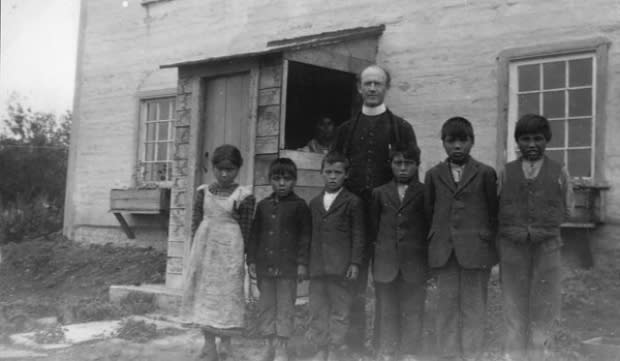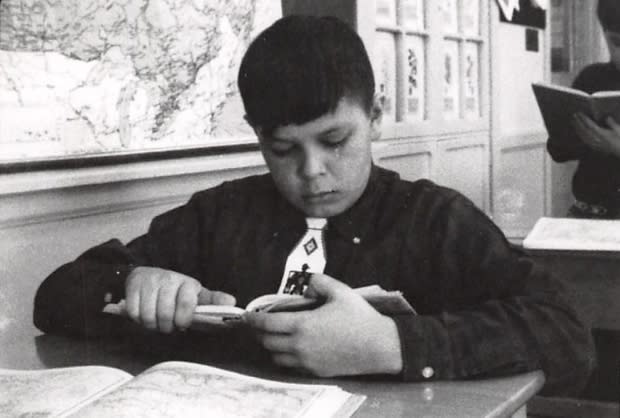Challenge to Indian day school settlement in Quebec court could stall deal
A recently filed court challenge of Ottawa's Indian day school settlement agreement could stall the deal, according to one of the lawyers behind the legal filing.
The filing, with the Quebec Superior Court, argues, among several issues, that the settlement agreement ignored the needs of francophone day school survivors by providing limited and inadequately translated documents.
The legal challenge was filed on May 10 on behalf of Lise Dubé, who attended a day school in Manawan, an Atikamekw First Nation, and James Jonah, who attended the Notre Dame Roman Catholic School in Waskaganish, a Cree First Nation.
Between 180,000 and 210,000 Indigenous students attended Indian day schools from 1920 until 1996. Many day schools were transferred out of Ottawa's administration in the 1970s. It's believed that between 120,000 and 140,000 day school survivors are still alive today.
A class action lawsuit over Indian day schools was filed by lead plaintiff Garry McLean, who was represented in recent years by Gowling WLG. McLean died earlier this year.
The proposed settlement agreement, which still needs a final approval by the Federal Court, proposes a paper-based compensation process that won't require hearings to set payout levels.
David Schulze, a Montreal lawyer with Dionne Schulze, said the day school settlement agreement unfolded with little thought for francophone day school survivors.

Schulze said the settlement agreement was available in English only until April 29, days before the objection submission deadline and about two weeks before hearings began on the proposed deal before the Federal Court in Winnipeg.
Schulze said only 31 pages of the settlement agreement have been translated into French, while 250 pages in the appendices and related documents remain only in English.
The translated documents are also problematic because they contain outdated and confusing terms, he said.
"We are saying suspend the Gowling action in Quebec."
Agreement and forms now available in French
Schulze said it is "hazardous to try to predict what a court would do," but said a win could complicate matters for the agreement.
"It could potentially stall it," he said.
Two NDP MPs have already raised the issue of proper French-language translations of the settlement agreement in a May 15 letter to Crown-Indigenous Relations Minister Carolyn Bennett.
"The lack of a reliable and official French-language version of the proposed settlement agreement during the objection window and up to the approval hearing is a clear violation of the … Charter rights of francophone survivors," said the letter from NDP MPs Charlie Angus and François Choquette.

Bennett's office said in a statement that the court approved plan for the settlement agreement is available in French and English and legal services provided in connection to the deal will also be bilingual.
"Many of the schedules, such as the schools list, were being revised up until the hearing date to ensure that they were comprehensive," said the statement.
"Translated material was provided as soon as it was available."
Gowling, which is getting $55 million in legal fees as part of the deal, has hired Argyle Public relations to handle media request.
In a statement through Argyle, Gowling said all documents approved by the court "have been or will be" translated. The statement said the settlement agreement, notice forms, objection and statement forms have now been translated into French and five Indigenous languages.
Concerns with compensation claims process
Schulze said the settlement agreement currently excludes the school the plaintiff Jonah attended even though it was administered by Ottawa until 1978.
Jonah, who suffered abuse at the school, witnessed other students being dragged by the hair "and having their hair pulled out, with flesh stuck to the hair," according to the filing.
He also witnessed student-on-student physical and sexual abuse "while teachers laughed," said filing.
Schulze said there are also issues with how the settlement agreement would handle compensation claims of severe cases of abuse.
The compensation claim form breaks down abuse into five separate categories. Level 1, for issues like verbal abuse, can net $10,000 in compensation.
The upper level, Level 5, for severe and repeated abuse, is capped at $200,000.

Ottawa has said it will provide up to $1.4 billion for Level 1 compensation claims and has no limit for payouts for Level 2 to Level 5 abuse claims.
While Ottawa can object to only five per cent for an abuse claim at the Level 2 category —which includes sexual touching or abuse causing broken bones, it can object to all of a Level 5 claim — which includes repeated sexual assaults or abuse causing permanent injury.
Schulze said Canada can file any documents to support its objection but it doesn't have to disclose any documents to the claimants.
"They can cherry-pick documents," he said.
Ottawa has a dubious track record on document disclosure with the residential school compensation process. In one case, Ottawa withheld thousands of police documents from compensation cases involving St. Anne's Indian residential school.
The Gowling statement said that "survivors' stories will be accepted in good faith and...favour will rest on the side of the survivor."
Schulze also questioned why Level 2 abuse required "touching for a sexual purpose" when the Supreme Court ruled in a residential school compensation case this past April that the proper standard should be touching a child in a way "that exceeds recognized parental contact."
Gowling said if a victim experienced "unwanted, inappropriate touching" they would qualify for compensation.

